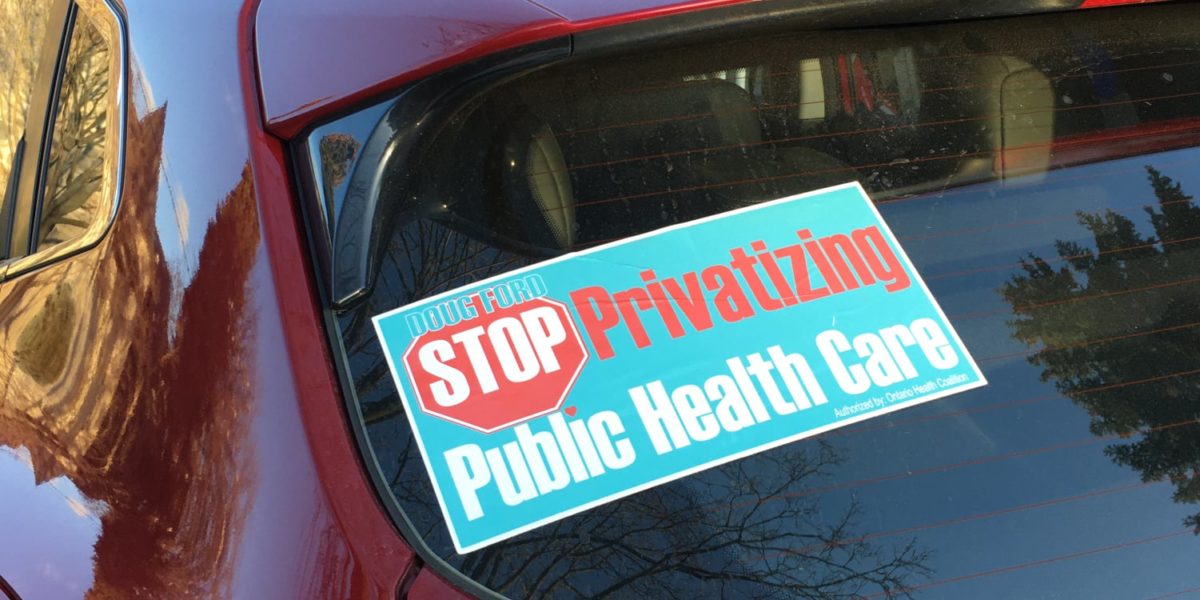Luis Marco Siega is a volunteer with the Halton Health Coalition, and is encouraging the public to get engaged with the upcoming citizens referendum on health care in Ontario.
“I’m part of this community. I’m a citizen of this country. I want my fellow citizens to have the same benefits that I have,” said Siega.
Siega lived in Toronto, Montreal, San Francisco, Boston and Ottawa over the course of his life before settling in Oakville, Ont.
When he heard about Bill 60: Your Health Care Act, Siega joined Halton Health Coalition.
Bill 60 essentially proposes to expand for-profit health care in Ontario by allowing a still undefined range of procedures and services to be carried out in new facilities called ‘integrated community health services centres.’
Historically, redirecting public health care to for-profit agencies has resulted in poorer patient access, safety and outcomes at a greater overall cost.
“I want the people in my community to be able to have access to health care when they need it,” Siega shared. “I pay my taxes just so my neighbour doesn’t have to worry about whether he has enough money to pay for health care.”
Siega lived in the US for several years. There he encountered people without access to health insurance through their work and others whose health insurance wasn’t comprehensive enough requiring them to pay out-of-pocket.
“Even something small like a couple of thousand dollars, people don’t have that in their bank account. Therefore, they take on health care debt,” shared Siega. “It’s upsetting from an ethical standpoint and also from an economical standpoint. We have people struggling with health care debt on top of any other expenses they might have.”
Siega saw a lot of money concentrated into the hands of health care insurance companies leaving people without enough to spend on groceries, housing, and student debt.
According to Siega, the average Canadian values free universal health care and Ontarians in particular are not comfortable with the Conservative government’s expanded privatization plans and the lack of accountability to their constituents.
“I’m opposed to privatization of any kind. People pay their taxes so they have access to their community hospital and clinics. Privatization creates a barrier for people who can’t pay,” said Siega.
The business graduate who has worked in both the for-profit and non-profit sectors, claims the scrutiny is much greater for non-profits, as is transparency.
Not-for profits also have a cap on administration costs as opposed to costs for personal support workers, nurses, or program staff where there is no cap. Costs must be reported quarterly to the government to ensure the not-for-profit is on track to hit pre-set targets.
For-profit health care is all about how much money the corporation can make. These facilities can choose to pick a small number of the easiest cases as long as they make a profit.
“We will be subsidizing an organization whose goal and efforts will be directed towards improving the profits for their shareholders as opposed to making sure the people in our communities are healthy,” observed Siega.
He points out that Bill 124, Protecting a Sustainable Public Sector for Future Generations Act, which limits public service wage increases to one per cent, applies to nursing staff and PSWs in not-for-profit settings and not to private clinics or agencies who pull these workers from the public system with higher wages and bonuses.
Siega encourages everyone in Ontario who cares about universal health care to get involved and volunteer with their local Ontario Health Coalition and to vote during the May citizen referendum to stop the privatization of hospital services.
“Even if you think it’s a small thing to do, it has a big impact,” Siega said.
The referendum is being run by regional health coalitions and will allow Ontarians to weigh in on Premier Doug Ford’s privatization efforts.



